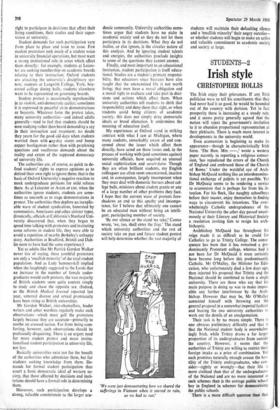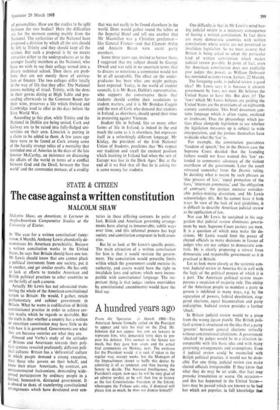Irish style
STUDENTS-2
CHRISTOPHER HOLLIS
The Irish enjoy their grievances. If any Irish politician were to tell his constituents that they had never had it so good, he would be hounded out of the country with derision. Yet in fact prosperity there is increasing at a steady rate, and it seems pretty generally agreed that the nation will reject the government's invitation to it to abandon proportional representation at their plebiscite. There is much more interest in developments in the university world.
Even ecumenism is beginning to make its appearance—though in characteristically Irish form. 'The Hon. Mrs wrote a western paper recently in reporting a religious conver- sion, 'has repudiated the errors of the Church of England and embraced those of the Church of Rome.' Under the watchful eye of Arch- bishop McQuaid nothing like an interdenomina- tional exchange of pulpits is yet possible. Yet Dr McQuaid seems to be rendering a service to ecumenism that is perhaps far from his in- tention. For his flock, like naughty schoolboys before their master, enjoy themselves in finding ways to circumvent his intentions. The over- whelmingly Catholic undergraduates of the National University the other day passed unani- mously at their Literary and Historical Society a resolution inviting him to resign his arch- bishopric.
Archbishop McQuaid has throughout his reign made it as difficult as he could for Catholics to go to Trinity College. The conse- quence has been that it has remained a pre- dominantly Protestant college, whereas had it not been for Dr McQuaid it must certainly have become long before this predominantly Catholic. Mr O'Malley, the Minister for Edu- cation, who unfortunately died a few days ago, then injected his proposal that Trinity and the National should be combined to form a single university. There are those who say that his main purpose in doing so was to make impos- sible any further interference by the Arch- bishop. However that may be, Mr O'Malley contented himself with throwing out the general proposal in a somewhat imperial fashion and leaving the two university authorities to work out the details of an amalgamation.
Their task is by no means simple. There 1, one obvious preliminary difficulty and that is that the National student body is overwhelm- ingly Irish, while Trinity draws a far larger proportion of its undergraduates from outside the country. However, it seems that the authorities of Trinity are willing to restrict their foreign intake as a price of combination. Yet such promises naturally enough arouse the hos- tility of the Trinity undergraduates, who con- sider—rightly or wrongly—that their life :3 more civilised than that of the undergraduates of the National and are no more interested an such schemes than is the average public school boy in England in schemes for democratising the public schools. There is a more difficult question than thlt
of personalities. How are the studies to be split between the two bodies? Here the difficulties are for the moment coming mainly from the National. The authorities of the National have proposed a division by which all the arts should be left to Trinity and they should keep all the science. But such a proposal is by no means attractive either to the undergraduates or to the younger faculty members at the National, who have no wish to see their college turned into a dreary technical school. Then there are prob- lems that are not merely those of curricu- lum or finance. The two colleges differ totally in the way of life that they offer. The National knows nothing of ritual. Trinity, with the dons in their gowns dining at High Table and pro- ceeding afterwards to the Common Room for their wine, preserves a life which Oxford and Cambridge used to offer in the days before the First World War.
According to this plan, while Trinity and the National in Dublin are being united, Cork and Galway are to be raised into fully-fledged uni- versities on their own. Limerick is putting in a claim to be added to them. A few years ago there were to be found at Cork among some of the faculty strange relics of a mentality that reminded one of America in the days of the late Senator McCarthy, an insistence on discussing the affairs of the world in terms of a conflict between God and the Devil, between the 'free world' and-the communist menace, of a crudity that was not easily to be found elsewhere in the world. Dons would gather round the tables at the Imperial Hotel and tell one another that Mr Macmillan was a Christian gentleman- like General Franco—and that Clement Attlee and Aneurin Bevan were secret party members.
Some three years ago, invited to lecture there, I suggested that my subject should be George Orwell and was told in no uncertain terms that to discuss so notorious a communist would not be at all acceptable. The effect on the under- graduates has been what one might perhaps have expected. Today, in the world of student councils, it is Mr Reen, Dublin's representative, who supports the conservative thesis that students should confine their resolutions to student matters, and it is Mr Brendan Coggin and the men of Cork who demand that students in Ireland, as elsewhere, should spend their time in protesting against Vietnam.
Student life in Ireland, like so many other forms of life in Ireland, is indeed in the end much the same as it is elsewhere, but expresses itself in a refreshingly different language. Mr Kinlay, the president of the Irish National Union of Students, proclaims that 'We respect our tradition and recall the eminent position which learning in Ireland had when the rest of Europe was lost in the Dark Ages.' But at the end of it we find that all that he is asking for is some money for students.







































 Previous page
Previous page